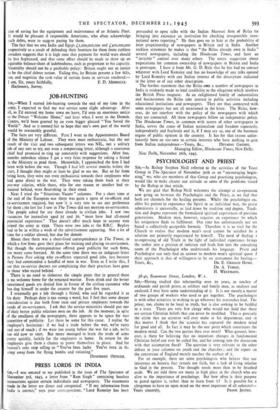Sra,—Having studied this relationship over 20 years, as teacher of
ordinands and parish priest, as celibate and family man, as analyser and analysed, I may have some understanding of it. It is not merely a matter of two groups of workers who need to get together. The psychologist is with other scientists in wishing to go wherever his researches lead. The priest, too, claims to be loyal to truth, but is also seeking to be faithful to a trust. There are very few clergy who would not hold that there are certain Christian beliefs that can never be modified. This is precisely the claim that no scientist • will ever make in his department, and in this matter I think that the scientist has captured the modern mind for good and all. In fact it may be the one point which constitutes the modem mind. Can the two parties then ever meet? What ground, how- ever, is there for believing that no important changes in fundamental Christian belief can ever be called for, and for coming into the discussion With that assumption fixed? The question is very relevant to the other debate in your columns on youth and the churches ; and the report on the conversion of England merely touches the surface of it.
For an example, there are some psychologists who believe that our insistence on historic fact reveals not faith, but a lack of living relation to God in the present. The thought needs more than to be brushed aside. We are told there are many in high place in the church who are alive to the importance of psychology. But how often is their purpose to guard against it, rather than to learn from it? Is it possible for a clergyman to have an open mind on the most important of all subjects?—






























 Previous page
Previous page